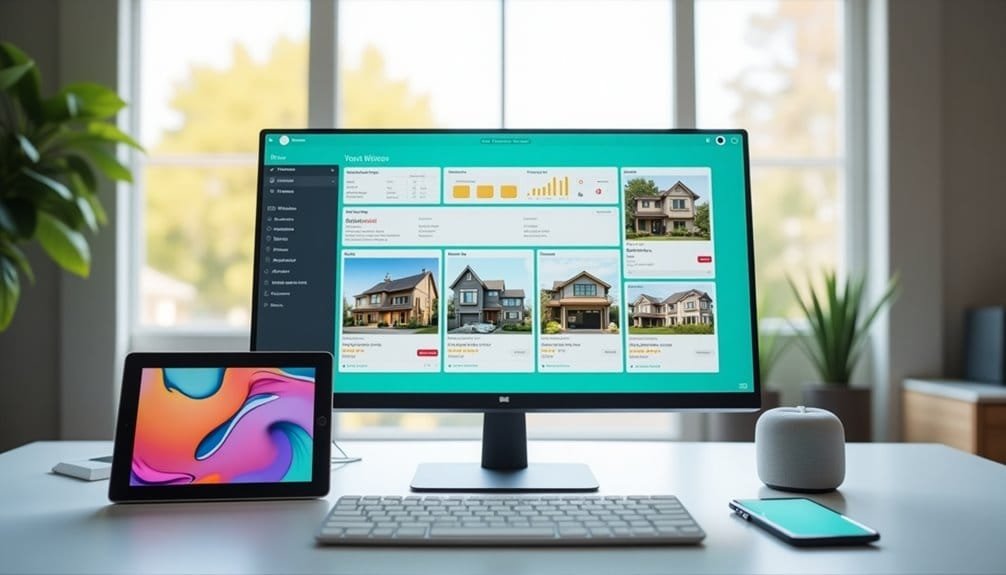To stay organized with multiple real estate transactions, centralize your document and task management. Use consistent naming conventions and role-based access permissions to protect sensitive data. Digital tools like transaction management software automate document processes and reduce manual errors. Create custom checklists to track progress and guarantee compliance with local regulations. Foster open communication channels to build trust with clients, and personalize your approach based on their needs. Stay informed with regular reviews of compliance requirements, and employ effective crisis communication strategies. By integrating these strategies, you’ll enhance efficiency and professionalism, paving the way for even more successful transactions.
Key Takeaways
- Utilize centralized document management systems to minimize confusion and ensure easy access to all transaction-related documents.
- Implement consistent naming conventions and folder hierarchies for organized storage of client and property information.
- Automate tasks using transaction management software to reduce manual errors and save time.
- Use role-based access permissions to secure sensitive documents and ensure only authorized personnel can view them.
- Maintain regular audits of document management practices to ensure compliance and prevent legal issues.
Managing Real Estate Files

Managing real estate files efficiently is crucial for maintaining order and guaranteeing smooth transactions. Start by centralizing your storage with a single platform to keep all transaction documents in one place. This minimizes confusion and reduces the risk of losing important data. Effective document management reduces administrative costs and accelerates closing, ensuring that transactions are processed efficiently and effectively. Create a folder hierarchy where you set up a main folder for each client, including subfolders for different properties and document types like contracts, disclosures, and reports. Use consistent naming conventions, such as “PropertyAddress_DocumentType_Date”, to quickly identify documents.
Digital storage is critical, so opt for electronic storage over paper to reduce clutter and enhance accessibility. Guarantee security by assigning role-based access permissions, allowing only authorized personnel to view sensitive information. Regularly audit and review these permissions to maintain compliance and security. By adopting digital tools and paperless solutions, real estate professionals can centralize documents and tasks in one platform, thereby streamlining their workflow.
Use transaction management software that offers end-to-end solutions, including unlimited cloud storage and mobile access, so you can manage documents anytime, anywhere. Integration with fewer systems simplifies your workflow, and custom checklists help track documents and tasks seamlessly.
Only upload executed documents to the primary storage to keep your files clutter-free, while optional separate folders can organize unsigned or in-progress documents if needed.
Task Management Strategies
Effective task management strategies are essential for managing real estate transactions smoothly. By identifying and organizing key tasks, you can guarantee each transaction is handled efficiently and thoroughly.
Start by defining the essential tasks and stages, such as pre-approval, underwriting, inspections, closing, and post-closing. Creating task templates for these stages helps maintain consistency and thoroughness, ensuring nothing slips through the cracks. Customizing workflows to fit specific needs can transform basic task management into a powerful workflow engine, which enhances efficiency and control over transactions. Incorporating automation tools can further streamline these processes by reducing manual errors and improving overall productivity.
Here’s how you can streamline your task management:
- Prioritize and Automate: Utilize a task management system to prioritize tasks across all transactions, and automate due dates based on closing dates or contract signings. This guarantees you stay on top of deadlines without constant manual tracking.
- Centralize Information: Use a centralized platform to manage all transaction-related information. This centralization allows for easy access to data, reducing the time spent searching for documents or details.
- Streamline Communication: Foster open communication among your team members and streamline workflows by using task management software. Clear processes eliminate inconsistencies and improve overall efficiency. Implementing a task management system can also enhance productivity by organizing daily responsibilities.
Leveraging Digital Tools

In the fast-paced world of real estate, leveraging digital tools can be a game-changer for streamlining transactions and enhancing client experiences. Digital transaction management platforms like Docusign automate processes, allowing you to sign and manage documents seamlessly within a single workspace. These platforms help reduce errors by providing access to the latest state and local association forms with autofill capabilities, ensuring transactions are smooth and compliant. Docusign for REALTORS® is a member-exclusive plan tailored for real estate professionals, providing specialized access and enhanced efficiency in transaction processes. Digital transaction management platforms also offer secure storage and access to important documents, simplifying collaboration with clients, agents, and lenders. To further enhance efficiency, integrate your CRM, accounting, and real estate apps. This integration minimizes data entry errors, speeds up deals, and maintains a cohesive workflow across your business. You’ll find that collaborating with agents becomes more straightforward when you guide them through each transaction step using Docusign Rooms. Additionally, utilizing email marketing tools can help you nurture leads effectively and maintain client engagement throughout the transaction process. Virtual reality (VR) also offers transformative potential by creating immersive property tours. VR allows clients to explore properties remotely, saving time and resources while broadening your audience reach through online sharing. This engaging experience increases the likelihood of closing deals, particularly with long-distance buyers. Lastly, utilize digital lead generation tools to automate and streamline finding new clients. By targeting specific demographics and analyzing leads, you can refine your strategies and attract the right audience effectively.
Ensuring Compliance
To guarantee compliance in real estate transactions, it’s essential to understand and adhere to the myriad of federal, state, and local regulations that govern the industry. Compliance means meeting fiduciary duties such as loyalty, confidentiality, obedience, competence, and accounting. Be aware that failing to do so can result in legal actions, fines, or even criminal convictions. Each jurisdiction can have different rules, so it’s imperative to familiarize yourself with local requirements. Utilizing management tools such as automated checklists and monitoring systems can streamline compliance tasks and provide oversight of agents’ activities, enhancing overall adherence to regulations. The involvement of a transaction coordinator can also be invaluable, as they manage administrative tasks and ensure that all parties are updated and compliant throughout the process.
Here’s how you can guarantee compliance:
- Understand Regulatory Requirements: Stay informed about the laws affecting advertising practices, property transactions, and document storage. Regularly review these to prevent any legal mishaps.
- Manage Time and Contingencies: Keep track of time-bound contingencies like home inspections and loan approvals. Missing these can cause deals to stall or collapse, so proactive management is necessary.
- Document Management and Storage: Maintain a complete paper trail from listing to closing. Systematically store and make documents accessible in real time. Confirm key documents like listing and purchase agreements are reviewed by designated brokers.
Effective Communication Practices

Mastering effective communication practices in real estate transactions can make the difference between a smooth closing and a deal falling apart. Start by setting clear expectations with all parties involved. Transparent communication fosters trust among buyers, sellers, and agents, ensuring a collaborative environment. Communicate timelines honestly to prevent misunderstandings.
Agents should maintain open communication channels with clients, providing realistic timelines and assessments. Buyers should actively ask questions if anything is unclear and promptly supply necessary documents. Sellers need to be transparent about property conditions and respond quickly to offers.
To build trust and credibility, personalize communication based on individual client needs and preferences. While digital platforms can streamline communication, face-to-face interactions shouldn’t be overlooked. Effective communication is critical for understanding client needs and tailoring services accordingly.
Negotiation and persuasion hinge on clear, convincing communication, and effective crisis communication helps manage unexpected setbacks. Organize your communication by using transaction management software to automate processes and enhance efficiency.
Thorough documentation and prompt communication are vital to avoiding delays. Set clear guidelines for communication channels and times, encouraging active listening and swift responses to inquiries. Keep contact information and preferred communication methods well-organized for everyone involved.
Professional communication enhances efficiency and reputation. Avoid jargon, explain complex concepts clearly, and make sure follow-up actions are completed to facilitate smooth transactions.
Frequently Asked Questions
How Can I Effectively Prioritize Tasks Across Multiple Real Estate Transactions?
To effectively prioritize tasks across multiple real estate transactions, imagine juggling balls in the air—each task needs attention at the right time.
Use digital tools like Trello and Todoist to keep tasks visible and organized. Set reminders and batch similar tasks for efficiency.
Implement time-blocking to guarantee dedicated focus on urgent matters. Regularly review your task list, guaranteeing deadlines are met.
With structured routines, you’ll navigate your transactions smoothly.
- Prepare for Loan Maturities and Refinancing Waves as a Real Estate AgentIn mastering loan maturities and refinancing waves, uncover strategies every real estate agent needs to empower clients during pivotal financial transitions.
What Methods Help in Balancing Client Communication and Document Management Efficiently?
To balance client communication and document management, integrate your CRM system with transaction management tools.
This centralizes client data and documents, ensuring seamless access and organization. Use automated reminders for timely follow-ups and deadlines, enhancing efficiency.
Implement client portals for secure document sharing, fostering transparency and trust.
Consistent naming conventions and digital files minimize clutter and improve accessibility, allowing you to stay organized while maintaining strong client relationships.
How Do I Handle Unexpected Issues That Arise During Real Estate Transactions?
To handle unexpected issues in real estate transactions, you need to adopt a proactive approach.
Establish clear communication channels and use standardized templates for efficiency.
Create thorough checklists that cover all regulatory requirements, and regularly update them.
Implement task management tools like Trello to prioritize and batch tasks.
Be adaptable, reviewing emails and calendars daily for urgent matters.
Also, use automated workflows to prevent errors and guarantee smooth operations.
Recent Posts

Top Continuing Education Courses for Real Estate Agents

How to Use Instagram Reels and Stories for Real Estate Leads

Cold Calling Strategies for Real Estate Lead Generation
What Strategies Can Prevent Burnout When Managing Several Transactions Simultaneously?
To prevent burnout while managing multiple transactions, prioritize self-care and set clear boundaries between work and personal time.
Use task batching to handle similar activities efficiently, and implement time blocking to allocate focused periods for specific tasks.
Leverage technology to automate routine processes, reducing manual workload.
Regularly review your workload, and don’t hesitate to delegate tasks when needed.
Maintaining a structured routine and seeking support from your team can further alleviate stress.
How Can I Stay Updated With Real Estate Market Trends Amidst Busy Transaction Management?
You’re juggling so much, yet staying updated with real estate market trends is essential.
Immerse yourself in automated market alerts for timely updates, and leverage real estate apps for instant data. Allocate specific research times, ensuring market insights don’t slip through the cracks.
Join professional groups and subscribe to industry newsletters for a continuous flow of information. Integrate market analysis into your routine, empowering you to make informed, strategic decisions with confidence.
Bottom Line
In the whirlwind of managing multiple real estate transactions, staying organized is your anchor. By managing files effectively, implementing task management strategies, and leveraging digital tools, you guarantee smooth sailing through complex processes. Emphasizing compliance and fostering clear communication practices are the keys that open efficiency. Like a symphony conductor orchestrating harmony, your role is pivotal in aligning all elements seamlessly, making certain every transaction is a success. Embrace these strategies, and watch your real estate endeavors flourish.






